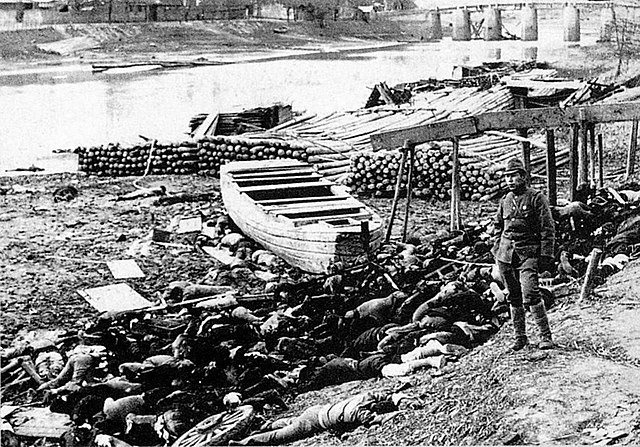


The Nanjing Massacre was the mass killing of Chinese civilians in Nanjing during the Second Sino-Japanese War. Read about it here.
Search Char787.com
In the early 20th century, tensions between China and Japan were high. During the Second Sino-Japanese War, Japan had been gaining large areas of China, taking Shanghai in 1937 and Nanjing in 1938. Following their annexation of Nanjing, one of the worst atrocities in history - the Nanjing Massacre, also known as the Rape of Nanjing - took place. Read more about it below.



Scan the QR code below to listen to an audio recording of this page:

The Nanjing Massacre was the mass rape and murder of Chinese civilians by the Imperial Japanese Army during the Second Sino-Japanese War. At least 20,000 women were raped, giving the event its nickname as the 'Rape of Nanjing'. Japanese soldiers often targeted children and the elderly. Rounding up civilians in a field and using them as bayonet practice was a common occurence. The massacre resulted in the deaths of some 200,000 to 300,000 Chinese civilians and the burning of at least 1/3 of the city's buildings.

Scan the QR code below to listen to an audio recording of this page:

The Nanjing Massacre began on December 13, 1937 and lasted for 6 weeks. It began 2 weeks after the start of the Battle of Nanjing, where Japanese troops invaded Nanjing for control of the city, which itself began a few days after they had taken the city of Shanghai. The battle was one of the first major conflicts between the Republic of China and the Empire of Japan during the greater Second Sino-Japanese War, which lasted from July 1937 to September 1945.

Scan the QR code below to listen to an audio recording of this page:

The Nanjing Massacre occured in the city of Nanjing, the capital of the Republic of China at the time. The city, which was a major economic hub for several centuries, is situated 300 km up the Yangtze River from Shanghai, a major port city in Eastern China. Japanese forces had been moving further west into China from Shanghai, which they had just captured a few days prior to reaching Nanjing.

Scan the QR code below to listen to an audio recording of this page:

The Nanjing Massacre was a mostly one-sided event by the Central China Area Army of the Imperial Japanese Army. The Japanese believed that the capture of Nanjing would force the Chinese into surrendering. Though some Chinese soldiers were present, known as the Nanjing Garrison Force, they were untrained and low in numbers since Nationalist leader Chiang Kai-Shek had removed most official Chinese troops for fear of losing them. Japanese soldiers easily defeated the Chinese troops, proceeding to murder hundreds of thousands of Chinese civilians and soldiers, loot and burn at least a third of Nanjing's buildings, and rape tens of thousands of women.
Many foreigners had also been living in the city at the time. They risked their lives to create the International Committee for the Nanking Safety Zone, a zone within the city that the Japanese were not supposed to attack, protecting the Chinese civilians that lived there.

Scan the QR code below to listen to an audio recording of this page:

The Nanjing Massacre was part of the greater Second Sino-Japanese War. Japan, which faced the problem of insufficient natural resources in its mainland, aggressively expanded its influence into various parts of China. They wanted to become a major global power and promote its vision of The Greater East Asia Co-Prosperity Sphere led by Japan. Japanese forces invaded Shanghai in mid-1937 and Nanjing later that year. Reports on the reasons for the Nanjing Massacre vary. Some argue that it occurred due to a lack of discipline among Japanese soldiers while they were low on rations. A more widely agreed-on reason was that it was a deliberate strategy to frighten the Chinese into surrendering.
Additionally, fighting as a soldier in the Imperial Japanese Army was tough, as orders from commanders were strict. Japanese soldiers were fed harsh propaganda about the Chinese, prompted by Japan's desire to become a central Asian power. This, along with Japanese soldiers' exhaustion from fighting for several months as they made their way deeper into China, prompted the raping, looting, and killing in Nanjing.

Scan the QR code below to listen to an audio recording of this page:

A Japanese soldier standing beside the corpses of Chinese civilians on a riverbank.

Japanese soldiers using captured Chinese prisoners as bayonet practice.

Chinese civilians litter the streets following a Japanese assault.

Destruction in Nanjing following Japanese attacks.

Scan the QR code below to listen to an audio recording of this page:

"There is not a single shop outside our Zone that has not been looted, and now pillaging, rape, murder, and mayhem are occurring inside the Zone as well. There is not a vacant house, whether with or without a foreign flag, that has not been broken into and looted."
- John Rabe, German businessman residing in Nanjing at the time of the Japanese invasion.

Scan the QR code below to listen to an audio recording of this page:

Unearthed skeletons of a group of victims.

Footprints of some survivors.

Scan the QR code below to listen to an audio recording of this page:

Citizens: Amidst the mass killing, entire families were wiped out. Civilians lived under a constant fear that Japanese soldiers would break into their homes and take them away, as groups of civilians being led away to killing fields was a common sighting. Those who were lucky enough to survive were left without homes or belongings, and often without their family. Many developed PTSD and depression after the event.
Chinese Soldiers: Many Chinese soldiers, fearful of being killed, threw away their uniforms and hid amongst the civilian population. However, the Japanese Army remained keen on hunting down and killing every last Chinese soldier, even after they had already taken control of the city. The War of Resistance against Japanese Aggression, as it was known in China, ultimately resulted in heavy Chinese casualties.
Japanese Soldiers: As the Nanjing Massacre was mostly a one-sided event, Japanese soldiers faced little resistance. A combination of harsh propaganda from Japan against the Chinese, strict orders from commanders, exhaustion from months of fighting, and short rations led to the lust and mindset that prompted Japanese soldiers to do what they did.
Foreigners: Some foreigners allowed Chinese troops to hide in the Nanjing Safety Zone. However, those who were caught doing so were killed by the Japanese. Chinese civilians weren't the only ones prone to PTSD and depression. Simply witnessing the event caused many foreigners to develop depression years after they returned to their home countries. Several even committed suicide while writing about what they saw, such as missionary Minnie Vautrin and journalist Iris Chang.

Scan the QR code below to listen to an audio recording of this page:

Had foreigners living in the city not personally witnessed the chaos and reported on it, the Nanjing Massacre likely would've remained a small local event in the Pacific Theater. Most readers in the West dismissed reports on the massacre as anti-Japanese propaganda, and the topic wasn't widely talked about in China. Years later, many Japanese scholars refuted the supposed severity of the event, arguing that there were only a few civilian casualties and that it was merely a 'minor incident' within the larger Second Sino-Japanese War. Several even outright deny that it happened, such as Japanese historian Shudo Higashinakano, who claims that the Nanjing Massacre was fabricated as war-time propaganda by the Chinese government. Decades later, Japan has given 3 trillion yen of Official Development Assistance to China and has formally apologized for its wartime crimes, particularly for what happened in Nanjing.



